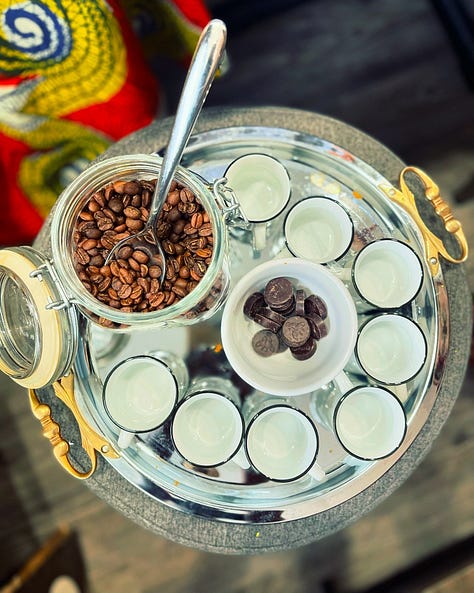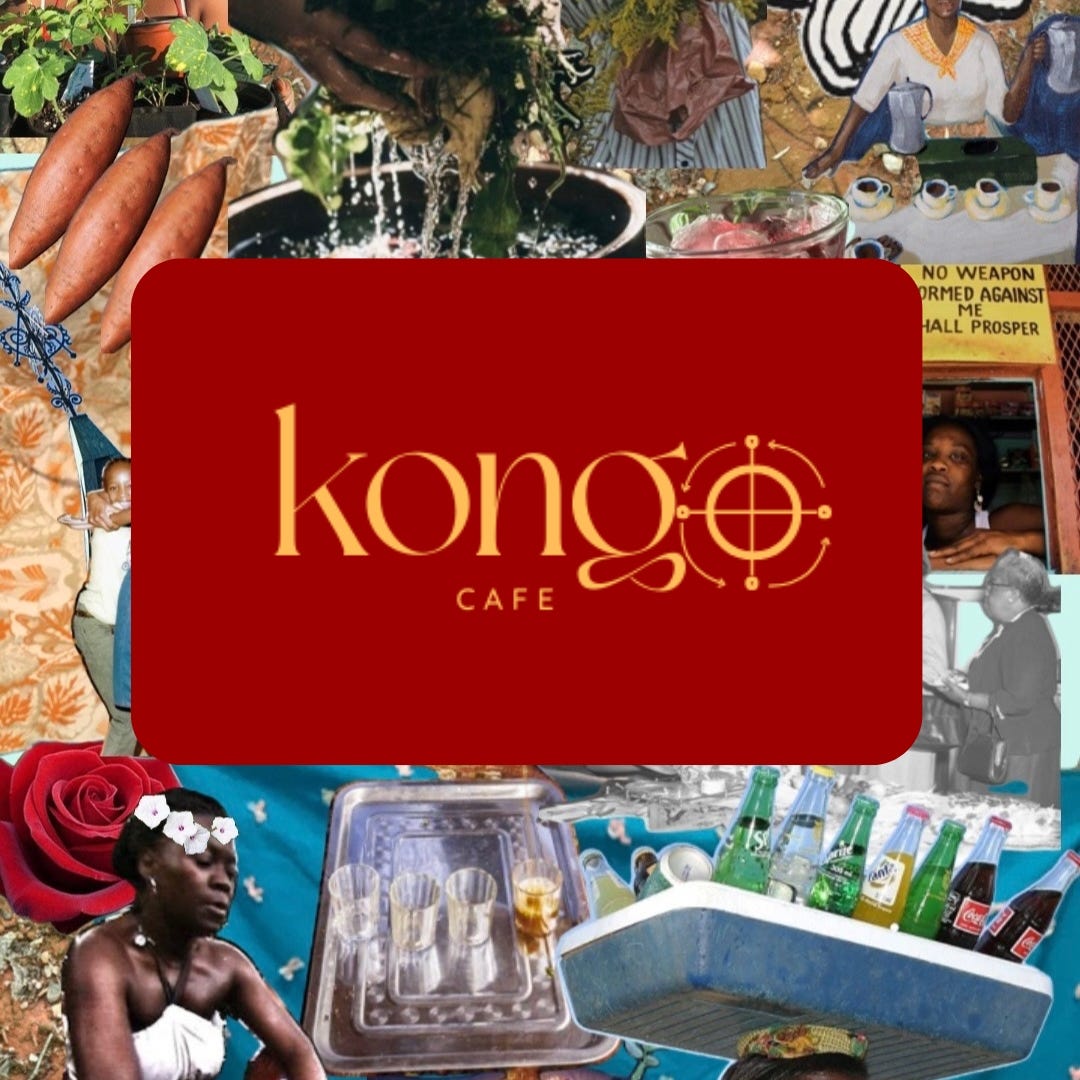Last summer, under the buzzing hum of cicadas and the hot intensity of Black August, I created Kongo Cafe. Weaving together my grief at the genocide raging on in Congo1, my love of African centered coffee culture, and a deep desire to gather safely in the midst of an ongoing pandemic, I began create my response to the call emitting from the land/Congolese kin/myself to do something beyond just witnessing the world descend into chaos and violence. As the first iteration of Kongo Cafe began to take shape, a plethora of stories, people, experiences, and places emerged as inspiration.
Some of those being:
Getchusomegear- a local solidarity collective led by coffee workers of color, who make coffee, sell art, and raise funds for Palestine.
Congo Square- An outdoor space that served as a respite, commercial and spiritual gathering space for both free and enslaved Africans in New Orleans.
Les Vendueses- Black women who sold coffee and West African treats on the streets of pre-emancipation New Orleans. Rose Nicaud was one of several vendeuses who were enslaved and used this as an avenue to purchase her freedom.
Sankofa Video & Books- A black owned bookstore cafe and pan-African hub in Washington, DC that I worked at during my college years.
Ethiopian Coffee Ceremony- Coffee was first discovered by farmers in the mountains of Ethiopia. They have created a culture of ceremony around coffee which I was blessed to experience firsthand when I traveled there with a friend in 2019.
By September, things were in full swing, and I hosted my first Kongo Cafe event at Afrikiko’s Bistro near the Durham Hayti community2. There were over 40 friends, family, and community members masked up and huddled in the cozy, afrocentric interior of Afrikiko’s. I held an Ethiopian and Cuban inspired coffee ceremony, while my mom and sister sold slices of the hibiscus poundcakes I’d made. We all leaned in to hear recent updates and calls to action from Maurice at Friends of Congo who had joined via Zoom. In October, hurricane Helene hit western NC hard, leaving a path of devastation and loss. I held a smaller Kongo Cafe event shortly afterwards to raise funds and collect supplies for impacted farmers.



In the quiet hours before each of these events, I could be found in my kitchen whipping up poundcakes, marbling them with hibiscus infused batter, and simmering pots of sorrel steeped with cinnamon, clove, ginger, and floral waters. As I crafted these AfroCarolina treats3, I felt increasingly connected to the lineage of southern Black women I grew up with who created their own rituals of love and communal care through nursed pots and long hours spent in their kitchens. I also grew a connection to the exhaustion they undoubtedly felt at the conclusion of each cookout, new years dinner, and church repast. My knees ached, my feet hurt, and my bank account was dry following both of the two Kongo Cafe events I organized.
Walking the Dikenga
As the days became shorter and colder, I approached a personal crossroads around how to sustain Kongo Cafe and whether it was truly meeting what the times were calling for. It felt indicative of a broader standstill within the movement for liberation. Protests against genocide had become few and far in between, a more brazen fascist was elected into office, covid denialism was increasingly normalized in even the most “radical” of spaces, a new statewide anti-masking law was passed, and a dark cloud of despair seemed to coat every conversation. After a few months of oscillating between feelings of depression and overwhelm, I gave myself permission to officially pause Kongo Cafe, detach myself from the instagram algorithm, and walk the dikenga4.
The dikenga, or the Kongo cosmogram, is an African concept originating from the Bakongo people of the pre-colonial Congo basin5. It’s depicted as a circle with four quadrants symbolizing the cycles of life and death, as well as the connection between the physical and ancestral realms. This sacred circle found its way to the Americas with the enslaved ancestors who embedded it into ring shouts, train tracks, and literal crossroads adorned with pennies, candy, and prayers. This became a space where one could both face important decisions, and shape change through connecting with the spirit of (ex)change itself.
From the start, it felt important to include the dikenga in Kongo Cafe, as it resonated with both ancestral and spiritual ties to the Congo. But as I entered a season of sacred pause and review, I realized that it was also a call to be more in tune with the sources of life and death in my own life and broader community.
Walking the dikenga, is a way to commune with spirit and your ancestors; to co-create a more liberatory future with them.
Message from the Crossroads
My walk with the dikenga (and my own mental health) have reminded me that adapting to today’s sociopolitical climate has to include holding on to the ancestral ways of being that have gotten African and other indigenous peoples through apocalypse before. Whether apocalypse meant enslavement or forced displacement, stealing away into the brush to hold ceremony, dance and pray, making medicine with foraged herbs, and developing networks of care outside of carceral systems have all been ancestral strategies for survival.
These past few months have also taught me that what we can see/touch/smell/taste/hear/feel contributes to our ability to discern what’s real and what’s not. What’s urgent, and what needs to be mulled on a bit longer. What’s contributing to our àṣẹ, or life force, and what’s diminishing it. I usually know my poundcakes are done due to the smell that wafts from the oven before I even go over to check it. My chai turns a creamy dulce de leche color that signals the spices are finished steeping in the milk, and are ready for a spoonful of honey. My eyes often hurt after a few days of prolonged screen time; and my heartbeat quickens anytime I check my instagram notifications.
This sense of knowing through active engagement with the body and senses is something that to me, feels deeply connected to how we can cultivate a deeper level of discernment to fight against the forces of fascism and constant overstimulation from social media6. These forces that serve to distract us both from our work and disconnect us from our bodies. Through my walk with the dikenga, I am reminded that gathering together, telling our stories, preserving our histories, and being connected to the land are all ancestral technologies that have helped us stay connected to both the individual and collective body. This is the work I’m committed to facilitating in a more intentional and sustainable way in part through this newsletter.
“Ceremony is a way to recode our bodies”- Juan Garcia7
With this new iteration of Kongo Cafe, I’m slowing down- taking time to feel, build relationships rooted in solidarity, and enjoy the process of creating offerings that help connect us to our ancestral medicines. This newsletter is the main way that I’ll be sharing and archiving my process- posting pictures of the herbs I’m growing with Black farmers, writing about AfroCarolina foodways, my creative practice, and the impacts of fascism both locally and abroad, while planting seeds for future in person offerings here in Durham (which you’ll be the first to hear about when they’re ready).
To be honest, I’m still with the energy of the dikenga- making offerings of prayer and presence to create the types of radical community and solidarity centered spaces that I yearn for. This substack is an invitation to meet me at the crossroads. This won’t last forever- it’s a temporary meeting ground for us to develop our craft, exchange medicine and messages, catch up on what’s happening in the world, and commune long enough to get us to the next space. But until then, I invite you to talk back, ask questions, make suggestions, and let me know what resonates and what doesn’t. Solidarity, even on the internet, can only be sustained through relationship. It’s my hope that through this transition, I can be in more intentional solidarity with people of the global majority both local to me and abroad.
“We, as cultural workers, people who labor in paintbrushes, camera lenses, Photoshop, song, pen and paper, and other forms of artistic labor, have to see ourselves and our work as weapons in a war for liberation.” - Musa Springer8
This article with the Black Agenda report and organizers from Congolese Action Youth Platform speaks to the ongoing genocide in Congo. Friends of the Congo and Focus Congo are both organizations that do Congo solidarity and relief work.
Hayti was a historic Black community in Durham, NC that’s legacy still lives on today through the Hayti Heritage Center.
Term coined by folklorist and womanist cartographer,
. I also have a newsletter called Afro Carolina Correspondence where I dive deeper into the Black history and culture of the Carolinas.Mama Rue is an elder based in Chicago who founded the Walking the Dikenga Collective and is who I first heard the phrase from.
Mojo Workin’: The Old African American Hoodoo System by Katrina Hazzard-Donald, Pg. 35.
I first learned about the concept of embodiment through trainings with Black Organizers for Leadership & Dignity (BOLD). Some of those trainers have built up more work/teachings on this concept at The Embodiment Institute.
This is a quote from the How We Be Free: A Black fugitivity study kit created by Jessica Valoris.







